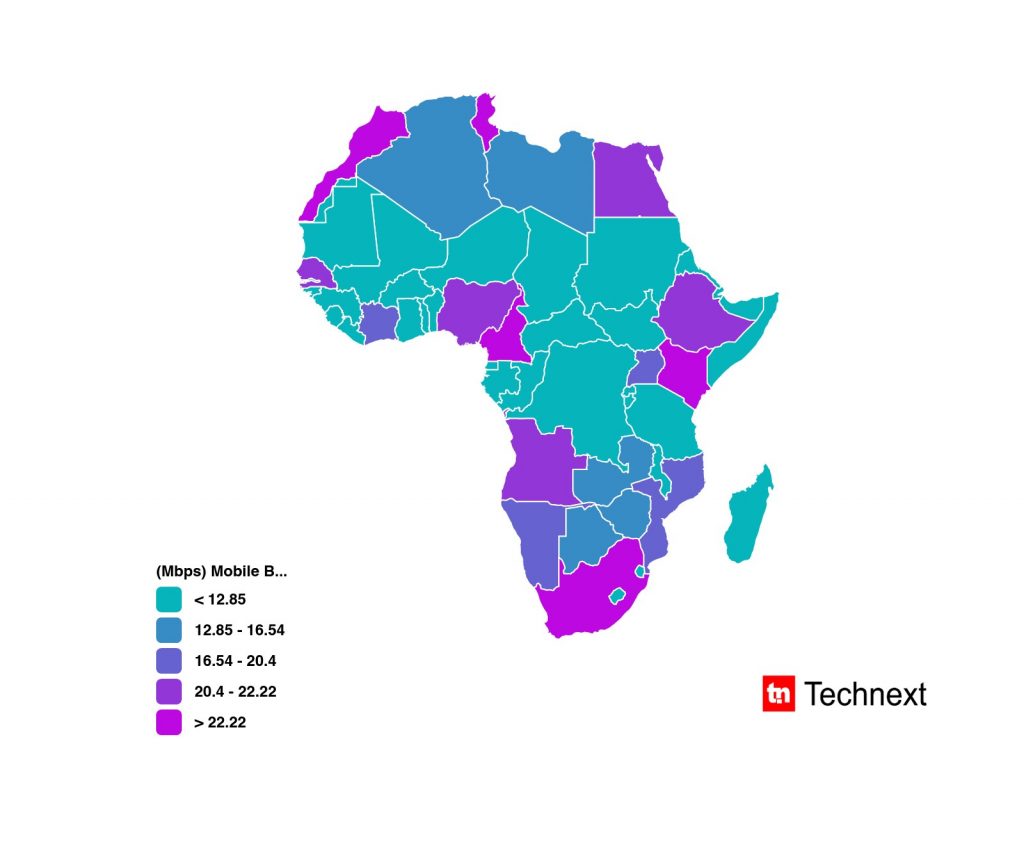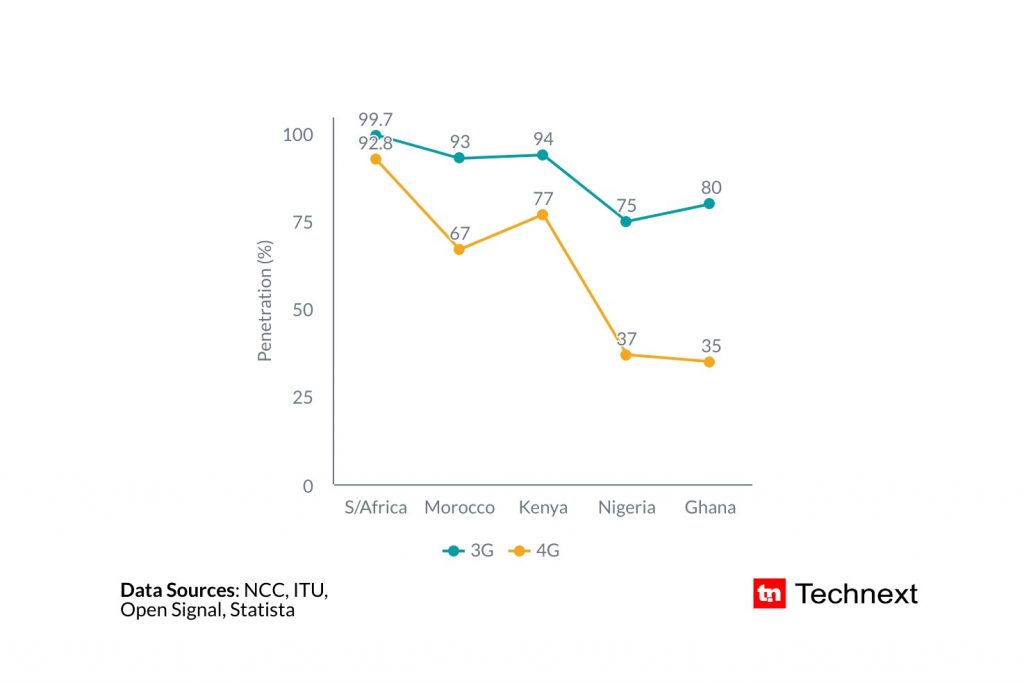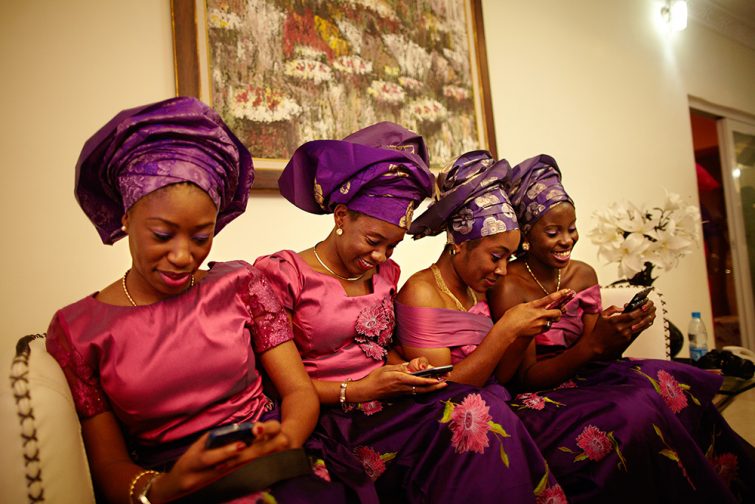Ghana, home to Twitter’s first Africa office, has one of Africa’s slowest internet. This is according to Ookla’s Speedtest Global Index monthly report on mobile and fixed broadband speeds as of March 2021. With a lowly internet speed of 1.4 MBps, Ghana finds itself trailing 23 other African countries featured in the report.
The report, which aggregates network speed tests from more than 10,000 high-performance servers in over 190 countries, sees the United Arab Emirates (UAE) top the global rankings with a mobile broadband speed of 22.31 megabytes per second. This is equivalent to 178.52 megabits per second (Mbps) (0.125 MBps equals 1 Mbps).
Behind UAE is South Korea (21.31 MBps), followed by Qatar (20.92 MBps). China (18.8 MBps) and Saudi Arabia (16.71 MBps) complete the top 5 of 140 countries featured in the report. The United States comes in at 19 with 9.52 MBps while the United Kingdom ranks 32 with 6.95 MBps.
South Africa has Africa’s Fastest Internet
South Africa leads 23 other African countries represented in the Speedtest global ranking by mobile broadband speed. Ranked 51, South Africa records a top speed of 5.31 MBps.
At 5.31 MBps, it will take just over 3 minutes (188 seconds) to download a 1 gigabyte (1GB) movie in South Africa.


Morocco (4.54 MBps), Tunisia (3.67 MBps), Cameroon (3.1 MBps) and Kenya (2.91 MBps) make up the rest of the top 5 African countries with the highest internet speeds.
Only ten (10) African countries are listed in the top 100, including Mauritius, Angola, Ethiopia, Egypt and Senegal.
Nigeria ranks 103 with a mobile broadband speed of 2.56 MBps, less than 0.5x that of South Africa.
Suffice it to say that no African country equals or exceeds the global mobile broadband speed average of 6.05 MBps.
That said, we examine why countries such as South Africa and Morocco surpass the likes of Nigeria in speed of mobile internet.
Mobile Broadband Penetration (3G and 4G)
Mobile broadband networks (3G and 4G) deliver high-speed internet access to subscribers. Therefore, the more area they cover in a country, the greater the average speed of internet connections.


For instance, South Africa has achieved 3G and 4G penetration levels of 99.7% and 92.8% respectively. In Morocco, up to 93% of mobile phone subscribers were covered by either 3G or 4G access as of December 2016. Also, Kenya’s Safaricom 3G and 4G networks cover 94% and 77% of the population.
On the other hand, Nigeria’s 3G network covers about 75% of the population. 4G deployment in the country is way lower at just 37%, having been largely limited to major urban areas such as Lagos, Abuja, Portharcourt etc. Slightly different from Nigeria, Ghana’s 3G and 4G penetration stands at 80% and 35% respectively.
The implication is that the vast majority of internet subscribers in countries like Ghana do not have access to 4G, which is 500x faster than 3G, and this has reflected in the very low mobile broadband speeds.
Meanwhile, South Africa and Kenya have already launched 5G networks.
Population Density
Apart from mobile broadband coverage, another factor that affects the speed of the internet across a region is population density (number of inhabitants per square km, inh/km2).


According to Network World, there is a direct mathematical correlation between population density and broadband access quality. High-speed broadband infrastructure is usually concentrated in areas with higher population densities as internet service providers seek the best returns on investment.
However, when an entire country is taken into consideration, the effect of broadband access far outweighs that of population density in terms of internet speed.
For context, African countries with very high internet speeds such as South Africa, Morocco and Kenya have low population densities of 49.2 people per KM square (49.2/km2), 83.6/km2 and 94.7/km2 respectively. Nigeria and Ghana, with high densities of 223/km2 and 133/km2, have slower internet connections.
This goes to show that with the likes of South Africa having deployed mobile broadband infrastructure covering almost the entire country, its scarce population structure only slighlty influences network speeds.
In countries as Ghana, the reverse is the case.
In summary
It is abundantly clear that rolling out high-speed mobile broadband beyond major cities to the last mile is key to achieving faster internet in African countries.
While Nigeria and Ghana are still struggling to extend 4G access, 5G subscribers in South Africa have already reached an estimated 90,000. In fact, 5G users in the country are projected to reach 11 million by 2025, with a population coverage of 43%, according to a report by Africa Analysis.
Going by the current state of play in Africa’s telecom sector, South Africa is poised to keep topping the charts when it comes to mobile broadband speed on the continent.






